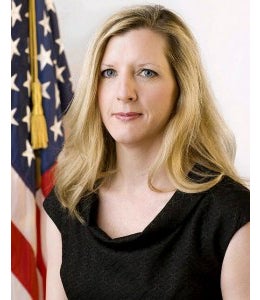Imagine having a fast-paced, high-stakes, high-profile legal job where every interaction with your boss is immortalized by a photographer as you make your recommendations that almost certainly will have implications for the United States and the rest of the world. Did I mention that these photos are often tweeted in real time? This is what it's like to have the ultimate in-house gig of White House Counsel to the President, according to Kathy Ruemmler, former White House Counsel to President Obama.
Of course, Ruemmler is no stranger to performing under pressure. Before working with the Obama Administration, she was a federal prosecutor who helped lead the government's case against Enron's former executives. She also served as associate counsel to President Clinton. In a recent candid conversation in San Francisco, Ruemmler discussed with me a few principles that have guided her through her very satisfying career and professional life:

Take career risks early, and take them often. According to Ruemmler, lawyers are too risk averse and don't take enough risks when it comes to their careers. By avoiding risks, they most certainly limit themselves, their career choices, and their experiences. Ruemmler encourages lawyers to take career risks early, especially because we have very long careers. Of course, developing a "nose" for good opportunities is something that will come with practice. Ruemmler recommends that lawyers considering a career risk actively consider whom — the offering firm/organization, the lawyer, or perhaps both parties — the prospective opportunity primarily benefits. In this way, lawyers can systematically analyze each potential leap of faith.
Judgment can be improved with listening and observations. Ruemmler believes that good judgment — or the "ability to see around the corner" — is a developed, not innate, characteristic. Actively listening and observing are the two actions that over time lead to better judgment. In fact, that's what Ruemmler did for her first three months as White House Counsel. By doing so, she quickly discovered that President Obama has a strong preference for concise and direct conversation and that everyone requested 15 to 30 minutes with President Obama. To be effective and stand out, she never requested more than five minutes with the president, and always aimed to take no more than two and a half minutes each time. Ruemmler credits her ability to give President Obama just what he needed to do his job, and curate the top two options for each difficult decision, in order to develop a close and trusting relationship with the president.
The negative reactions of others often have nothing to do with you. Ruemmler astutely observed that everyone around the president wants him to be pleased. However, he is a human being first, and therefore was not always be pleased — even when she did her job well and right. Over time Ruemmler noticed that president's displeasure often had nothing to do with her, but perhaps was a function of extraneous events out of her control. For example, the president's displeasure may have been the result of a loss by his favorite sports team. Accordingly, Ruemmler learned not to take everything personally.
Be a reliable lawyer first. At the end of the day, the only way a lawyer can develop a relationship of trust and confidence is by being someone others don't mind sharing a foxhole with. In other words, consistently having your client's back is the most important characteristic of in-house counsel, and that paves the way to satisfying long-term legal practice. According to Ruemmler, Washington DC is full of "survivors" — long-term professional bureaucrats who are sometimes not fully invested in their clients or professional relationships. Although these people have their purpose, they are often difficult to trust and therefore don't always have the benefit of close relationships with clients, peers or superiors. Lawyers who are merely "survivors" don't tend to have satisfying long-term legal practice.
To say that I left the chat with Ruemmler inspired is an understatement. Her direct, thoughtful, no-nonsense discussion and advice are relatable and appealing. The gradual realization that Ruemmler, a 44-year-old woman who has already lived the lives of many men and women during her one lifetime was both motivating and energizing. After all, by our modern expectations, Ruemmler is likely not even at her career prime yet, and almost certainly has even more thrilling career opportunities on the horizon. And then there's the fact that despite her impressive professional career, the lawyer prioritizes her personal style! She openly discussed her fascination with fashion and her rebellious, eyebrow-raising approach to DC's female dress code. Overall, Ruemmler's acute insight on a satisfying legal career is matched only by her relatability and inspirational energy. Any lawyer — even those without personal photographers — could benefit from following her example.




